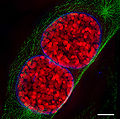Prophase: Difference between revisions
CSV import |
CSV import |
||
| Line 27: | Line 27: | ||
{{stub}} | {{stub}} | ||
{{dictionary-stub1}} | {{dictionary-stub1}} | ||
<gallery> | |||
File:Prophase_eukaryotic_mitosis.svg|Diagram of prophase in eukaryotic mitosis | |||
File:3D-SIM-3_Prophase_3_color.jpg|3D-SIM image of prophase | |||
File:Preprophase.jpg|Prophase | |||
</gallery> | |||
Latest revision as of 01:50, 18 February 2025
Prophase is the first stage of cell division in both mitosis and meiosis. During prophase, the complex of DNA and proteins contained in the nucleus, known as chromatin, condenses. The chromosomes become visible and the centrioles (in animal cells) separate and move to opposite poles of the cell. The nuclear envelope breaks down and spindle fibers form.
Overview[edit]
Prophase is preceded by Interphase and followed by Prometaphase. The primary function of prophase is to prepare the cell for the physical separation of its genetic material into two new daughter cells. This is achieved through the condensation of chromatin into chromosomes, the breakdown of the nuclear envelope, and the formation of the spindle apparatus.
Chromatin Condensation[edit]
At the beginning of prophase, the chromatin within the cell's nucleus begins to condense. This process transforms the chromatin, a long and loose strand of DNA, into tightly coiled chromosomes. Each chromosome is composed of two identical sister chromatids, which are joined at a region known as the centromere.
Nuclear Envelope Breakdown[edit]
As prophase progresses, the nuclear envelope, which separates the nucleus from the cytoplasm, begins to disintegrate. This allows the chromosomes to move freely within the cell, a necessary condition for the subsequent alignment and separation of the chromosomes.
Spindle Formation[edit]
Simultaneously with the breakdown of the nuclear envelope, the spindle apparatus begins to form. The spindle is composed of microtubules that extend from the centrioles, which have moved to opposite poles of the cell. The spindle fibers will eventually attach to the chromosomes and move them to the cell's equator.
Conclusion[edit]
Prophase is a critical stage in cell division, preparing the cell for the successful and accurate separation of its genetic material. Understanding the processes that occur during prophase can provide insights into the mechanisms of cell division and the causes of errors that can lead to conditions such as cancer.





